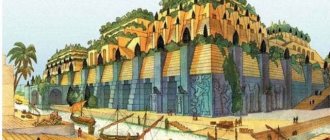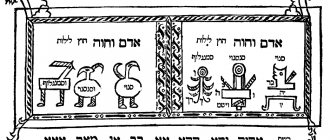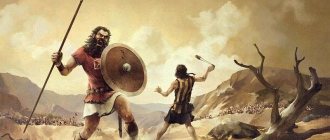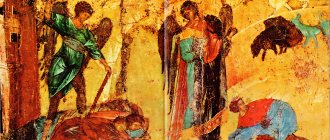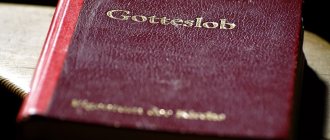Work submitted to the Republican competition of young artists of the Donetsk People's Republic “Triumph of Our Faith.” Author: Dzhugan Ira, 8 years old
Jonah is called disobedient, obstinate, and even a wrong prophet. However, he had reasons to disobey the Creator, which entailed a test from which Jonah learned a very important lesson. And the wisdom he acquired is useful for every Christian.
Brief Life
Jonah is an ancient prophet who left written evidence of his ministry. According to Jewish tradition, he was a student of the prophetic school founded by Elijah. And also - the fleet-footed young men sent by Elisha, Jonah’s mentor, to anoint Jehu as king (2 Kings 9:1-10).
There is a legend that Jonah’s mother is a widow from Sarapeta, with whom the prophet Elijah lived during the days of drought-induced famine. Thanks to the Lord, food and water in this house did not run out. Another grief befell him: little Jonah died of illness. Elijah, having prayed to the Lord, resurrected the boy. In Scripture the name of the mother is not mentioned, only the name of the father.
Frederic Leighton 1881 Prophet Elijah Resurrecting the Son of the Widow of Sarepta London, House Museum
These legends are recognized by the Russian Orthodox Church. There is no other information about the life of the prophet, with the exception of the story he told about the sermon in Nineveh.
+The name Jonah means “dove”, a symbol of humility and kindness. Jesus is humble and kind.
1 But I, Paul, who is modest among you personally, but bold against you in absentia, convince you by the meekness and forbearance of Christ. (2 Cor. 10:1)
This is how He is depicted for us:
“He was led like a sheep to the slaughter; and as a lamb is silent before its shearers, so He opened not His mouth” (Isa. 53:7; Acts 8:32).
When Jesus was baptized, the Holy Spirit descended upon Him in bodily form like a dove and remained upon Him.
22 And the Holy Spirit descended upon Him in bodily form like a dove, and there was a voice from heaven, saying: Thou art my beloved Son; My favor is in You! (Luke 3:22)
32 And John testified, saying, I saw the Spirit descending from heaven like a dove, and remaining on him. 33 I did not know Him; but He who sent me to baptize in water said to me: On whom you see the Spirit descending and remaining on Him, He is the one who baptizes with the Holy Spirit. (John 1:32,33)
What is the Book of Jonah
The Book of Jonah tells the story of a prophet who is commanded by God to proclaim in Nineveh, the political and religious heart of Assyria, that God's punishment awaits them. However, Jonah did not fulfill this command immediately.
The chronology of writing is difficult to determine. In 2 Kings. John 14:25 mentions Jonah himself, but there is no information about the writing of the book.
There is a possibility that its author was someone who lived after the collapse of Assyria. And he told the story of Jonah as a lesson to his contemporaries and future generations. Proof for supporters of this theory is that the book is written in the third person.
But other authors of the Old Testament also chose a similar style of narration: for example, Daniel (Dan. 1:1 - 7:1) and Isaiah (Is. 39:3-5). Thus, the focus was not on them, but on the Lord guiding them. Likewise, in the Book of Jonah, the main character is God, who takes the most active part in the events described. With his words it both begins and ends (Jon. 1:1-2; 4:11).
Moreover, it is unlikely that anyone other than Jonah himself would describe his disputes with God, which show the prophet to be by no means the most flexible of His servants. And the author is familiar with the customs and way of life in Nineveh firsthand.
Jonah the prophet. Fresco from the Vysoki Decani Monastery. Balkans. Serbia. Kosovo. XIV century
Historicity of the Book
The Old Testament was completed in 430, and since the Book of Jonah was included in it, it could not have been written in later years. The following facts testify to its historicity:
- It is recognized as canonical and not apocryphal.
- The ancient Jewish historian Josephus had no doubt about the authenticity of Jonah's story.
- Jesus Christ mentioned the ministry of Jonah and his stay in the belly of the whale (Matthew 12:41). His words had weight for listeners only if they were talking about a historical fact, and not a fictitious event.
Not everyone believes in the supernatural speed with which the plant that gave Jonah's shadow grew. But for the Creator of all things, such a miracle is a trifle.
Interesting fact
The plant that grew in a few hours, which saved the prophet from the heat, was probably the castor oil plant (castor oil is made from it). This is an evergreen fast-growing shrub, capable of reaching a height of 2 to 10 m. It has been cultivated in Egypt for the fifth millennium.
Most people are skeptical that Jonah survived in the whale's stomach.
How many days are there in the belly of a whale?
Only the Old Testament prophet is not the only one who managed to do this. Thus, a sperm whale swallowed the whaler James Bartley from the ship "Star of the East". Colleagues killed the animal that same day and, while cutting up the carcass, found James alive. Similar stories have been recorded involving whale sharks.
The word used in Scripture for the animal that swallowed Jonah is translated as “big fish” (Hebrew) and “sea creature” (Greek). In the Mediterranean Sea they could swallow a person whole:
- White shark:
- sperm whale;
- Finnish whale
Skeptics call this story from the life of Jonah a fiction: they say, a person cannot spend three days in a whale and survive.
“You saw the prophet running, listen to how he confesses from the depths - from the belly of the whale. He ran like a man, he confessed like a prophet... Both the sea and the whale showed supernatural obedience so that the prophet would come to his senses.”
John Chrysostom
Critical scientists did not believe not only in the story of the whale, but also in the reality of Nineveh. They were sure that such a large city could not have existed in ancient times. Their skepticism was defeated in the 19th century, when archaeologists found the ruins of the Assyrian capital.
Nineveh. Gate of Hadad. One of the fifteen gates of ancient Nineveh. Reconstruction was started by the Iraqis in the 1960s, but was not completed. The result is an uneasy mixture of concrete and crumbling adobe brick, which nevertheless gives some idea of the original structure. The lower portions of the stone retaining wall are original. Fortunately, the excavator left some parts uncovered, allowing the original Assyrian design to be seen. The original brickwork of the outer archway is clearly visible. The actions of the last defenders of Nineveh can be seen in the hastily built adobe structure, which narrows the passage from 4 m to 2 m. The height of the vault is about 5 m. Photo: Fredarha.
Prophetic and educational meaning of the Book
The Christian prophetic and transformative meaning of the Book of Jonah consists in the 3-day stay of the prophet inside a huge fish, which is a prototype of the 3-day stay of the Savior in the earth.
But that's not all. The main idea of the book: The Creator cherishes all his creatures and desires to save sinners and pagans as much as he desires to save his chosen nation. He proved that he cares what happens to other nations.
Lopukhin A. P. writes that the Jews assimilated this idea with difficulty, and this is clearly demonstrated by the example of Jonah himself. He had to change his mind, abandon his prejudices, but in the end he still came to terms with the fact that Israel does not have the exclusive right to enjoy the mercy of the Lord. God can condescend to other nations, even if they are at enmity with God's people, called to be the light of the nations. Salvation is a gift to the entire universe, not to one country.
The book of the prophet Jonah is a reminder to the covenant people of their missionary duty to save foreigners, and not at all to wish them to perish. The book also makes it clear that the prophecy of retribution for sins is not always the final verdict. Out of love for people, God will cancel it if you realize in time the unrighteousness of your lifestyle and ask the Father for forgiveness.
The prophets who lived after Jonah also taught that the kingdom of Christ is open to everyone. Including John the Baptist. Thus, they did not allow the people to forget the main idea of the Book of Jonah.
+Sins
For his own sins, Jonah gave himself up to save the ship's crew.
12 Then he said to them, “Take me and throw me into the sea, and the sea will be calm for you, for I know that for my sake this great storm has come upon you.” (John 1:12)
Jesus gave Himself, but not for His sins, for He...
22 He committed no sin, and no flattery was found in His mouth. (1 Peter 2:22)
Jesus laid down His life for the sins of the world to save it.
17 Therefore the Father loves Me, because I lay down My life in order to take it again. 18 No one takes it away from Me, but I myself give it. I have power to lay it down, and I have power to receive it again. I received this commandment from My Father. (John 10:17,18)
17 For God did not send His Son into the world to condemn the world, but that the world might be saved through Him. (John 3:17)
21 For He made Him who knew no sin for us to be sin, so that in Him we might become the righteousness of God. (2 Cor. 5:21)
24 He Himself bore our sins in His body on the tree, so that we, having been delivered from sins, might live for righteousness: by His stripes you were healed. (1 Peter 2:24)
Stories from the life of the prophet
Probably, under King Joash, the prophet predicted the victory of Israel over Syria, which came true under his heir Jeroboam. He eventually returned the lands conquered by the enemy and restored the former borders of his state. There are no other stories with Jonah, except for the salvation of Nineveh, in Scripture.
The most famous story
God revealed to Jonah that after 40 days Nineveh would be destroyed, and sent him there to preach in order to show the Assyrians the path to salvation through repentance. However, the prophet, tormented by pangs of conscience, nevertheless disobeyed and set off from the Mediterranean port of Joppa to the city of Tarshish.
Scenes from the life of the prophet. Ions. Church painting in Herkeberga, Uppland, Sweden. OK. 1480
On the way, a storm broke out, and the sailors, with the help of casting lots, found out that the culprit of the trouble was Jonah. The Prophet told him what his fault was and asked to be thrown off the ship so that the Lord would calm the waves. When Jonah found himself in the water, he was swallowed by a huge sea animal, and he continued to travel in it.
Three days later, God prompted the animal to leave Jonah on the shore and repeated the task. This time the prophet did not resist, and after his sermon the Ninevites - including the king - declared a fast, put on sackcloth and turned to the Lord in repentant prayer.
The Almighty had mercy on Nineveh - Jonah’s fears came true. He was mortally annoyed, not understanding what caused such kindness towards the wicked people. Then the Lord created something that Jonah could sincerely regret the loss of: a plant that saved him from the heat with its shade.
“Then the Lord said: you regret the plant that you did not work on and did not grow, which grew in one night and disappeared in one night: Should I not have compassion on Nineveh, a great city in which there are more than one hundred and twenty thousand people, those who cannot distinguish their right hand from their left, and a multitude of cattle?”
(Jon. 4:10-11)
Why did Jonah run away?
Jonah doubted from the very beginning that God would destroy the enemy city, because He was offering the foreigners the opportunity to escape. Jonah did not want to be branded a liar if the terrible prophecy was not fulfilled. And he was even more afraid that in this case God would be accused of deception or impotence.
Jonah did not want the wicked Nineveh to escape punishment, because its inhabitants were at enmity with the Jews. In addition, his contemporaries Amos and Hosea, warning the Israelites about the coming judgment, predicted their defeat precisely in the confrontation with Assyria:
“The Assyrian will be their king, because they did not want to turn to Me.”
(Hos.11:5)
The prediction came true in 722 BC. e., when the Assyrian king Sargon II captured most of the Israelites. Perhaps Jonah refused to call the Ninevites to repentance because he did not want to save those who would bring untold misfortune to his people in the future.
How it was ejected onto land and where it ended up
Jonah's journey in the whale ended near Nineveh. The fortified city was located on the eastern side of the Tigris River; 900 km from Samaria, the capital city of the Northern Kingdom. Nineveh was protected by 2 walls: a 40-meter internal one (about 20 m thick) and an external one.
Archaeological finds have allowed scientists to suggest that before the appearance of Jonah, the inhabitants of this large city suffered two famines. And on June 15, 763, they saw a total solar eclipse. And when Jonah began his preaching, the Ninevites could take the disasters they experienced and the frightening heavenly phenomenon as evidence of the Lord's wrath. Most likely, this contributed to the mass repentance of the townspeople.
Orientalist Henry Clay Trumbull, citing the Babylonian historian Berossus, writes that the inhabitants of Assyria and Babylon treated Dagon with great respect. This god was depicted as half-man, half-fish. Nineveh was one of the centers of worship of this deity. One of the rulers of Babylon in the 19th century BC. e. there was Ishme-Dagan, named after Dagon. According to the beliefs of the inhabitants of Mesopotamia, the beginning of the Chaldean civilization was associated with a half-man, half-fish.
This creature came out of the sea and gave people writing, science and all types of art, taught them the basics of agriculture and the rules of harvesting. From time to time, Dagon sent mentors who were supposed to convey his message to people. These were his avatars or incarnations that looked the same as the pagan god himself.
Perhaps the inhabitants of Nineveh perceived Jonah, who emerged from the depths of the sea and emerged from a huge fish, as a messenger of the deity they revered. Of course, Jonah did not support the pagan cult and declared the will of the Israeli God. In any case, the amazing appearance of the prophet had an indelible impression on the pagans, before whom the whole world was in awe.
Interesting fact
Archaeologists believe that just before the fall of the Assyrian Empire, its capital Nineveh was the largest city in the world.
+Preaching salvation
After the fish vomited Jonah onto dry land, he declared God's vengeance to sinful Nineveh, saying:
4 And Jonah began to walk around the city, as far as he could go in one day, and preached, saying: Another forty days and Nineveh will be destroyed! (John 3:4)
This sermon brought salvation to Nineveh.
10 And God saw their deeds, that they turned from their evil way, and God regretted the calamity which He had said He would bring upon them, but did not bring it. (John 3:10)
In the same way, Jesus proclaimed God's vengeance to a sinful world.
42 But whoever causes one of these little ones who believe in Me to stumble, it would be better for him if a millstone were hung around his neck and he were thrown into the sea. 43 And if your hand causes you to sin, cut it off: it is better for you to enter into life maimed, than having two hands to go into hell, into the unquenchable fire, 44 where their worm does not die and the fire is not quenched. 45 And if thy foot causes thee to sin, cut it off: it is better for thee to enter into life lame, than having two feet to be cast into hell, into the unquenchable fire, 46 where their worm does not die and the fire is not quenched. (Mark 9:42-46)
16 Whoever believes and is baptized will be saved; and whoever does not believe will be condemned. (Mark 16:16)
13 And he laid his hands on her, and she immediately straightened up and began to praise God. (Luke 13:13)
22 Moses said to the fathers: The Lord your God will raise up for you from among your brothers a prophet like me; obey Him in everything that He says to you; 23 And it shall come to pass that every soul that will not listen to that Prophet shall be cut off from among the people. (Acts 3:22,23)
Jesus' preaching brought salvation to all who obeyed Him.
28 Come to Me, all you who labor and are heavy laden, and I will give you rest; 29 Take My yoke upon you and learn from Me, for I am gentle and lowly in heart, and you will find rest for your souls; 30 For My yoke is easy and My burden is light. (Matt. 11:28-30)
16 Simon Peter answered and said, “You are the Christ, the Son of the living God.” (Matt. 16:16)
10 For the Son of Man came to seek and to save that which was lost. (Luke 19:10)
11 For the grace of God that brings salvation has appeared to all men, 12 teaching us that, denying ungodliness and worldly lusts, we should live soberly, righteously and godly in this present age, 13 looking forward to the blessed hope and the appearing of the glory of the great God and our Savior Jesus Christ, 14 Who gave Himself for us, to redeem us from all iniquity and to purify for Himself a special people, zealous for good works. (Titus 2:11-14)
Repentance of the inhabitants of Nineveh
It is not difficult to believe in the repentance of the Ninevites, if only because the man ejected from the belly of the fish fit perfectly into their mythological worldview.
“Jonah learned for himself that those who repent will be shown mercy. On it, Grace showed him an example of Her mercy towards sinners, showed that just as He was delivered by Her from the sea, so She would deliver the city mired in sins.”
Ephraim Sirin
Jesus even set the Ninevites as an example to his countrymen:
“The Ninevites will rise up in judgment with this generation and condemn it, for they repented at Jonah’s preaching, and behold, there is a greater Jonah here.”
(Luke 11:32)
On the one hand, the sincere gratitude of the pagans for the mercy God showed to them, on the other, the pride of the “stiff-necked” Jews.
Gustave Doré, Jonah in Nineveh.
The Dallas Seminary expositor notes:
The “spiritual insight of the shipmen” (Jonah 1:14-16), their concern for the life of the Hebrew prophet, contrasts sharply with the disdainful attitude of the Israelites towards “strangers.”
Interpretation of the Book of the Prophet Jonah:
The Book of Jonah is interpreted by the following sources:
- "Bible Encyclopedia RBO";
- Blessed Jerome of Stridonsky “Interpretation of the Book of the Prophet Jonah”;
- Lopukhin A.P. “Interpretation of the Book of the Prophet Jonah”;
- Matthew Henry, Interpretation of the Old and New Testaments;
- William Kelly Lectures on the Bible.
Jesus son of God
Jonah's stay in the belly of the great fish for three days and nights was a type of the three days and nights Jesus spent in the tomb.
Jesus said:
40 For as Jonah was in the belly of the whale three days and three nights, so the Son of Man will be in the heart of the earth three days and three nights. (Matt. 12:40)
With this account of Jonah in mind, we will consider the correspondences between him and Christ.
Images
Among the early Christian masters of art, the most popular plot involving Jonah was the one in which he is swallowed or already disgorged by a sea monster. It often resembles a sea dragon. Similar images are found on sarcophagi and in the Neapolitan Capadimonte Gallery.
Sarcophagus with Jonah, circa 300, Vatican Museum
Icons, frescoes, paintings
Painting of the ancient Roman cubicula of the Seasons in the catacombs of St. Peter and Marcellinus includes 3 scenes with Jonah: the sailors throw him into the abyss, he leaves the belly of the whale, in the last image the prophet is resting under a plant grown by God. Frescoes depicting Jonah adorn other religious buildings, including the Scrovegni Chapel in the Italian city of Padua (the artist is Giotto).
Painting. Catacombs of St. Peter and Marcellinus in Rome
The Lord led the prophet to describe the events he experienced, as well as his own thoughts and emotions, so that they would touch the hearts of his countrymen and make them think about the meaning of God in their lives. The book of Jonah is a lesson for all Christians: do not give up in advance on those who are not in God. The Lord is not only formidable, but also merciful. He will never reject the same sincere and ardent repentance that the prophet Jonah and the Ninevites demonstrated.
Victor Glebov
+Rescue
If not for Jonah's preaching, Nineveh would have been destroyed. The Ninevites repented after hearing the word of God from Jonah.
10 And God saw their deeds, that they turned from their evil way, and God regretted the calamity which He had said He would bring upon them, but did not bring it. (John 3:10)
Today people are saved by the preaching of the gospel.
15 And he said to them, “Go ye into all the world and preach the gospel to every creature.” 16 Whoever believes and is baptized will be saved; and whoever does not believe will be condemned. (Mark 16:15,16)
46 And he said to them, Thus it is written, and thus it was necessary for Christ to suffer, and to rise from the dead on the third day, 47 and that repentance and remission of sins should be preached in His name to all nations, beginning at Jerusalem. 48 You are witnesses to this. 49 And I will send the promise of My Father upon you; But stay in the city of Jerusalem until you are endued with power from on high. (Luke 24:46-49)
13 For whoever calls on the name of the Lord will be saved. 14 But how can we call on [Him] in whom we have not believed? how to believe [in] [Him] of whom you have not heard? How to hear without a preacher? 15 And how can we preach if they are not sent? as it is written: How beautiful are the feet of those who bring good tidings of peace! 16 But not everyone obeyed the gospel. For Isaiah says: Lord! who believed what they heard from us? 17 So faith comes by hearing, and hearing by the word of God. (Rom.10:13-17)
21 For when the world through [its] wisdom did not know God in the wisdom of God, it pleased God through the foolishness of preaching to save those who believed. (1 Cor. 1:21)
Just as Nineveh would have been destroyed if it had not heeded Jonah’s preaching, so people today remain spiritually lost; Eternal destruction will befall those who refuse to heed and obey the gospel of Christ.
16 For I am not ashamed of the gospel of Christ, for [it] is the power of God for salvation to everyone who believes, first to the Jew, [then] to the Greek. (Rom.1:16)
6 For it is right in the sight of God to repay those who insult you with tribulation, 7 and you who are insulted with joy together with us, at the revelation of the Lord Jesus from heaven with His mighty angels, 8 in flaming fire taking vengeance on those who do not know God and do not obey the gospel of our Lord Jesus. Christ, 9 who will be punished with everlasting destruction from the presence of the Lord and from the glory of His power (2 Thess. 1:6-9)
28 [If] one who rejects the law of Moses, in the presence of two or three witnesses, is without mercy [punished] with death, 29 then how much more severe punishment do you think he will be subject to, who tramples on the Son of God and does not consider as holy the Blood of the covenant by which he was sanctified, and the Spirit grace offends? 30 We know Him who said, “Vengeance is Mine, I will repay,” says the Lord. And one more thing: The Lord will judge His people. 31 It is terrible to fall into the hands of the living God! (Heb. 10:28-31)
25 Be careful that you do not turn away from him who speaks. If they did not escape [punishment] by not listening to him who spoke on earth, much less will we [escape] if we turn away from [He who speaks] from heaven (Heb. 12:25)
9 The Lord is not slack in fulfilling his promise, as some count slackness; but he is patient with us, not wanting anyone to perish, but everyone to come to repentance. (2 Peter 3:9)
+The Gospel is not a dead letter, but a word to which we must heed and obey.
CHRIST Mat. 12:38-40
- Jesus was humble and kind (2 Cor. 10:1; Isa. 53:7; Acts 8:32). The Spirit descended on Him in the form of a dove (Matthew 3:16)
- Jesus declared God's vengeance against a sinful world (Mark 9:42-46; 16:16; Acts 3:22,23)
- Jesus brought salvation to the world (Matt. 11:28-30; Mark 16:16; Luke 19:10; Titus 2:11-14)
- Jesus sacrificed Himself (John 10:17,18; 2 Cor. 5:21)
- Jesus sacrificed Himself for the sins of this world for the salvation of this world (John 3:17; 2 Cor. 5:21; 1 Pet. 2:24)
- Jesus was in the tomb for three days and three nights (Matthew 12:38-40; 16:18-21; Luke 24:21,46-49)
- Jesus came out of the tomb (Mark 16:9; 1 Cor. 15:1-8; Rom. 1:4)
- Jesus preached after His resurrection and commanded His apostles to preach (Acts 1:1-3; Matt. 28:18-20; Mark 16:15-20)
- People are saved by the preaching of the gospel (1 Cor. 1:21; Rom. 10:13-17; Mark 16:15,16; Luke 24:46-49)
- Perdition awaits those who do not heed the gospel (Rom. 1:16; Thess. 1:6-9; Heb. 10:28-31; 2 Pet. 3:9)
